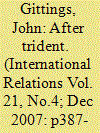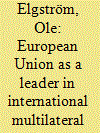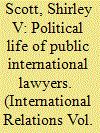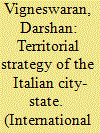| Srl | Item |
| 1 |
ID:
079898


|
|
|
|
|
| Publication |
2007.
|
| Summary/Abstract |
The British government decision on `Trident renewal' forms part of a much wider rebuff to the non-proliferation and peace agenda. The Nuclear Non-Proliferation Treaty risks being discredited at its next review in 2010; new nuclear powers are setting the pace for others; another `war' is being threatened which will last `for generations'. There has been no post-Cold War peace dividend, and the chance to make up for lost time has been missed. War, not peace, is once again seen as the universal default mode.
It is now clear that traditional arguments in favour of peace and nuclear disarmament are never going to succeed. The view that one `cannot predict the unpredictable', used to justify the Trident decision, will always result in decisions being reached on a worst-case scenario. New arguments need to be developed with a broader appeal based not only on strategic calculation but on a compelling alternative world view.
Looking both forward and back into history we have to rediscover peace, not war, as humanity's central concern. Just as the test of the good ruler in ancient China was to maintain peace within the four corners of the kingdom, so today modern states have a shared obligation to exercise good governance across the globe. The effort to reshape our common goals will require a sustained exercise in the re-education of elites, and the mobilisation of multitudes
|
|
|
|
|
|
|
|
|
|
|
|
|
|
|
|
| 2 |
ID:
079901


|
|
|
|
|
| Publication |
2007.
|
| Summary/Abstract |
This article analyses the leadership role of the European Union (EU) in international multilateral negotiations. The purpose is to problematize the role of the EU as a multilateral leader by contrasting its self-images as an active initiator with other negotiating actors' perceptions of the Union. This is done by comparing the role conceptions presented by EU representatives with the images presented by delegates from non-member states in three different multilateral negotiating contexts. My results present a picture of the EU as a `restricted leader'. The undisputable great power status that the EU is claimed to hold is not necessarily transformed into a leadership role. The causes vary: in two cases it is internal disunity and co-ordination problems that create obstacles to intellectual leadership; in the third case it is perceived role conflicts that make the EU less than credible in its leadership aspirations. The existing potential for structural leadership is therefore not translated into practice
|
|
|
|
|
|
|
|
|
|
|
|
|
|
|
|
| 3 |
ID:
079899


|
|
|
|
|
| Publication |
2007.
|
| Summary/Abstract |
The intervention of international lawyers in public debate in the US, UK and Australia regarding the 2003 invasion of Iraq spotlighted the political agency of international lawyers in according or withholding legitimacy from major foreign policy decisions and raised the question of how to delimit the scope of international lawyers' political agency. Rejecting the close fit of either the transnational advocacy network or epistemic community concepts to the role played by the collectivity of international lawyers, this article identifies factors that both permit international lawyers to function as the grantors or withholders of foreign policy legitimacy and serve to define the limits on their fulfilling that role
|
|
|
|
|
|
|
|
|
|
|
|
|
|
|
|
| 4 |
ID:
079902


|
|
|
|
|
| Publication |
2007.
|
| Summary/Abstract |
This article enters the recent debate on the decline in the features of international society within the current system by looking at the case of Russia; a case that has, to date, received little attention. Russia is considered one of the great powers. It is also characterised by a long-standing quest for membership in international society. In addition, Russia merits closer attention as a result of its strategic partnership with the EU. The EU offers Russia access to regional-level international societies with a thicker set of institutions than are available in its relations with the United States and Asia. The fact that Russia identifies itself with Europe has driven it to experiment with some of the solidarist institutions typifying EU-centred societies, most notably the market. As a result there are tangible prospects for maintaining and even expanding the features of international society at the level of greater Europe regardless of the systemic constraints
|
|
|
|
|
|
|
|
|
|
|
|
|
|
|
|
| 5 |
ID:
079900


|
|
|
|
|
| Publication |
2007.
|
| Summary/Abstract |
Long-term studies of European history address the origins and evolution of state territoriality. Some scholars have suggested that the late medieval revival of European cities engendered variation in this region's territorial practices. However, their work struggles to explain the origins, nature and demise of the territorially `fragmented' Italian city-states. This study addresses this gap by shifting focus from the city's economic functions to the state-building process occurring within Italian urban walls. It shows that Italian rulers deliberately `centralised' their resources to challenge the violent actors and military installations that had become concentrated in town. This analysis strengthens the argument that coercive factors drove the early evolution of European territoriality. The work uses these findings to create fresh lines of inquiry for research on variation in modern territorial forms
|
|
|
|
|
|
|
|
|
|
|
|
|
|
|
|